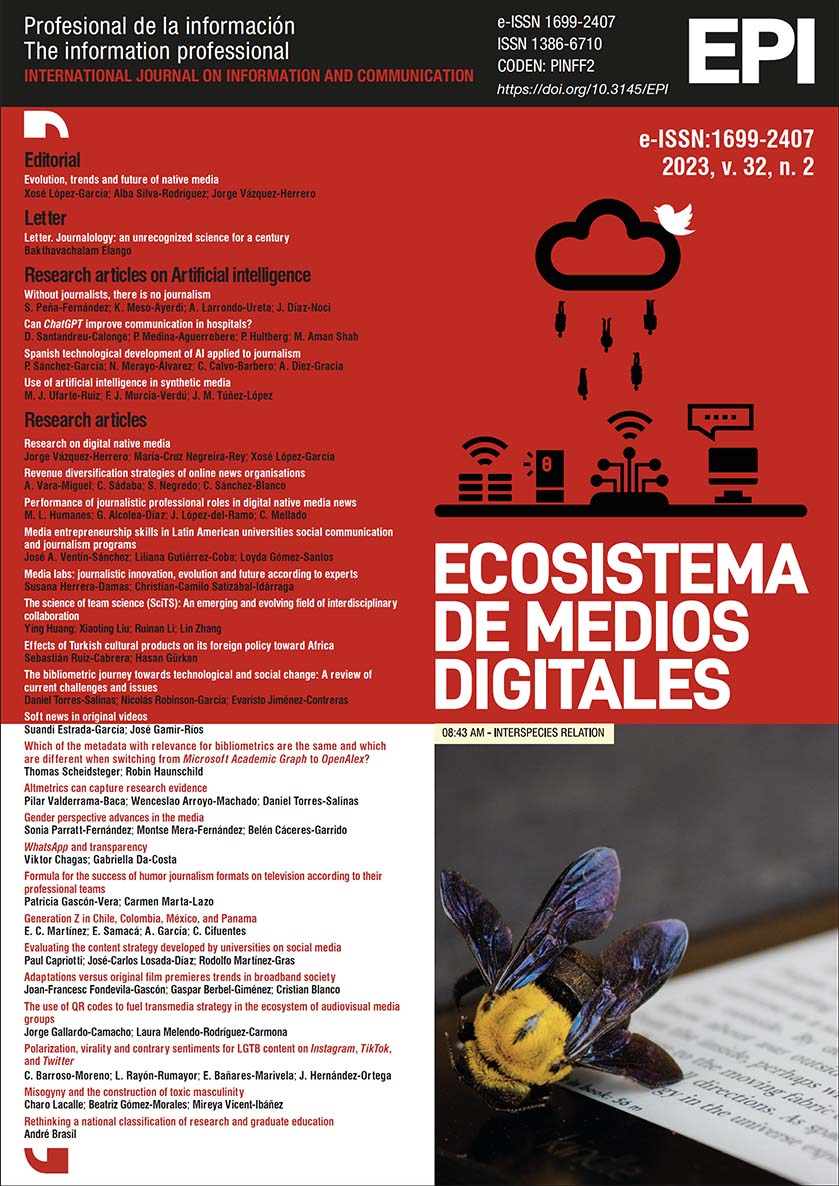Rethinking a national classification of research and graduate education
DOI:
https://doi.org/10.3145/epi.2023.mar.24Keywords:
Classification systems, Scientometrics, Science policy, Research evaluation, Graduate education, Brazil, OECD Fields of Research and Development (FORD), Unesco International Standard Classification of Education (ISCED), Evolutionary reviewAbstract
Brazil adopts a classification system of research and graduate education that is key to its high-stakes national evaluation. Originated in the 1970s, the system is organised around evaluation areas that have expanded and matured not only to support the evaluation dynamics in the country but also to address the immense growth of the National System of Research and Graduate Education (SNPG). This study investigates the origins, evolution and current profile of the Brazilian classification, identifying that five decades of expansion led the system to become somewhat peculiar, especially when compared with international classification systems such as the OECD Fields of Research and Development (FORD) and the Unesco International Standard Classification of Education (ISCED). The investigation and the comparisons conducted reveal that the system needs to be revised. For that, the study advances to propose a scientometric approach to rethink not only the classification of evaluation areas but also the allocation of research and graduate programs within them. The methods explored in this paper show the potential of the approach, as the different analyses performed can provide evidence to expert committees in the challenging task of performing an evolutionary review of the adopted classification system.
Downloads
References
AAAS (2022). The scope of the "Humanities" for purposes of the humanities indicators. https://www.amacad.org/humanities-indicators/scope-of-humanities
Balbachevsky, Elizabeth; Schwartzman, Simon (2010). "The graduate foundations of research in Brazil". Higher education forum, v. 7, n. 1, pp. 85-101. https://rihe.hiroshima-u.ac.jp/publications/wp/wp-content/uploads/2016/12/101732.pdf
Brasil, André (2020). "Building a national system of research and graduate education: How did the university become the house of science in Brazil?". Revista Nupem, v. 12, n. 27, pp. 222-253. https://doi.org/10.33871/nupem.2020.12.27.222-253
Brasil, André (2021). "A national evaluation push towards increased societal impact: The Brazilian experience in valuing broader research outputs". In: Proceedings of the Eu-SPRI conference 2021. Extended abstract, Oslo, Norway: EU-SPRI. https://www.euspri2021.no/abstracts
Brasil, André; Trevisol, Joviles-Vitorio; Van-Drooge, Leonie (2022). "Research evaluation in Brazil and The Netherlands: A comparative study". In: Proceedings of the EU-SPRI 2022. Extended abstract, Utrecht, Netherlands: EU-SPRI. https://euspri2022.nl/program
CAPES (2011). Portaria nº 83, de 6 de Junho de 2011. "Cria 4 áreas de avaliaí§í£o: Biodiversidade, ciíªncias ambientais, ensino e nutrií§í£o". Diário Oficial da Unií£o. Brasília, DF. https://bit.ly/383xcmX
CAPES (2016). Portaria nº 141, de 14 de setembro de 2016. "Define e disciplina as formas de colaboraí§í£o e os procedimentos de escolha dos consultores científicos (Ordinance No. 141/2016)". Diário Oficial da Unií£o. Brasília, DF. http://cad.capes.gov.br/ato-administrativo-detalhar?idAtoAdmElastic=307#anchor
CAPES (2020). "Tabela de Áreas de Conhecimento/Avaliaí§í£o". CAPES. Brasília, DF. https://www.gov.br/capes/pt-br/acesso-a-informacao/acoes-e-programas/avaliacao/instrumentos/documentos-de-apoio-1/tabela-de-areas-de-conhecimento-avaliacao
CAPES (2021a). "Avaliaí§í£o da Pós-Graduaí§í£o Stricto Sensu". Dados Abertos CAPES. https://dadosabertos.capes.gov.br
CAPES (2021b). "Coleta de dados dos programas de pós-graduaí§í£o". Plataforma Sucupira. Brasília, DF. http://sucupira.capes.gov.br
CAPES (2021c). "Portaria nº 122, de 5 de Agosto de 2021. Consolida os parí¢metros e os procedimentos gerais da Avaliaí§í£o Quadrienal de Permaníªncia da pós-graduaí§í£o stricto sensu no Brasil". Diário Oficial da Unií£o. Brasília, DF. http://cad.capes.gov.br/ato-administrativo-detalhar?idAtoAdmElastic=6742#anchor
CAPES (2021d). "Sistema de informaí§íµes georreferenciadas". Geocapes. Brasília, DF. https://geocapes.capes.gov.br
Castro, Cláudio-de-Moura; Soares, Gláucio Ary-Dillon (1983). "Avaliando as avaliaí§íµes da CAPES". Revista de administraí§í£o de empresas, v. 23, n. 3, pp. 63-73. https://doi.org/10.1590/s0034-75901983000300007
Clarivate (2022). Web of Science Core Collection. CWTS in-house version.
CNPG (1974). "Plano Nacional de Pós-Graduaí§í£o - PNPG 1975-1979". Brasília, DF: MEC.
Comissí£o Especial de Acompanhamento do PNPG 2011-2020 (2020). "Proposta de aprimoramento da avaliaí§í£o da pós-graduaí§í£o brasileira para o quadriíªnio 2021-2024: Modelo Multidimensional". CAPES. Brasília, DF. https://www.gov.br/capes/pt-br/centrais-de-conteudo/25052020-relatorio-final-2019-comissao-pnpg-pdf
Córdova, Rogério-de-Andrade (2001). "CAPES: Origem, realizaí§íµes, significaí§íµes (1951-2001)". Brasília, DF.
Dias, Ana-Maria-Iório; Therrien, Jacques; De-Farias, Isabel-Maria-Sabino (2017). "As áreas da educaí§í£o e de ensino na CAPES: identidade, tensíµes e diálogos". Revista educaí§í£o e emancipaí§í£o, v. 10, n. 1, pp. 34-57. https://doi.org/10.18764/2358-4319.v10n1p34-57
Ferreira, Marieta-de-Moraes; Moreira, Regina-da-Luz (eds.) (2002). "CAPES, 50 anos: Depoimentos ao CPDOC/FGV". Rio de Janeiro: Fundaí§í£o Getúlio Vargas.
Glí¤nzel, Wolfgang; Schubert, András (2003). "A new classification scheme of science fields and subfields designed for scientometric evaluation purposes". Scientometrics, v. 56, n. 3, pp. 357-367. https://doi.org/10.1023/a:1022378804087
Gouvíªa, Fernando-César-Ferreira (2012). "A institucionalizaí§í£o da pós-graduaí§í£o no Brasil: O primeiro decíªnio da CAPES (1951-1961)". Revista brasileira de pós-graduaí§í£o, v. 9, n. 17, pp. 373-397. https://doi.org/10.21713/2358-2332.2012.v9.312
OECD (2015). "Frascati manual 2015: Guidelines for collecting and reporting data on research and experimental development". http://oe.cd/frascati
Stern, Fábio-Leandro (2019). "A criaí§í£o da área de avaliaí§í£o ciíªncias da religií£o e teologia na Coordenaí§í£o de Aperfeií§oamento de Pessoal de Nível Superior (CAPES)". Espaí§os. Revista de teologia e cultura, v. 1, n. 26, pp. 73-91. https://espacos.itespteologia.com.br/espacos/article/view/62
Traag, Vincent; Waltman, Ludo; Van-Eck, Nees-Jan (2019). "From Louvain to Leiden: guaranteeing well-connected communities". Scientific reports, v. 9, n. 1, 5233. https://doi.org/10.1038/s41598-019-41695-z
Unesco (2015). "ISCED fields of education and training 2013: Detailed field descriptions". Unesco Institute for Statistics, Montreal. https://doi.org/10.15220/978-92-9189-179-5-en
Van-Eck, Nees-Jan; Waltman, Ludo (2009). "Software survey: VOSviewer, a computer program for bibliometric mapping". Scientometrics, v. 84, n. 2, pp. 523-538. https://doi.org/10.1007/s11192-009-0146-3
Published
How to Cite
Issue
Section
License
Copyright (c) 2023 Profesional de la información

This work is licensed under a Creative Commons Attribution 4.0 International License.
Dissemination conditions of the articles once they are published
Authors can freely disseminate their articles on websites, social networks and repositories
However, the following conditions must be respected:
- Only the editorial version should be made public. Please do not publish preprints, postprints or proofs.
- Along with this copy, a specific mention of the publication in which the text has appeared must be included, also adding a clickable link to the URL: http://www.profesionaldelainformacion.com
- Only the final editorial version should be made public. Please do not publish preprints, postprints or proofs.
- Along with that copy, a specific mention of the publication in which the text has appeared must be included, also adding a clickable link to the URL: http://revista.profesionaldelainformacion.com
Profesional de la información journal offers the articles in open access with a Creative Commons BY license.




